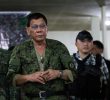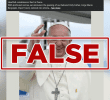Both the Democrats and Republicans come from the same corporate elite which exerts a strong influence on U.S. foreign policy. They may differ on some domestic issues but they are of the same mold with regard to America�s global trade, investment and security objectives.
By BOBBY TUAZON
Bulatlat
The Philippine Daily Inquirer�s Nov. 9 banner, �America Junks Bush,� which broadcast the Democrats� regaining control of the U.S. Congress in the mid-term elections as a result of President George W. Bush�s bungling of the Iraq war does not capture the whole story. The Democrats only proved to be better in using Bush�s setbacks in his war of aggression in Iraq as a political capital to regain legislative control but the election � seen by many as a referendum on Bush�s foreign policy � does not show that the opposition party is blameless for the debacle, either. In fact if a Democrat were seating as president instead of Bush, his party would have been trounced as well in the November polls.
Although the U.S. debacle in Iraq was a centerpiece issue in the elections, it is too early to say that it alone decisively swung the votes in favor of the Democratic Party. Opinion polls showed Bush�s public approval rating consistently plunging months after the U.S. invasion of Iraq in March 2003 and suffering a sharp deep during the campaign period with the number of U.S. soldiers killed reaching 2,800. Whether the typical American voter was however aware that this figure is minuscule compared to the 655,000 Iraqis killed (March 2003-July 2006, based on a Johns Hopkins University study), 35 percent of them directly by coalition forces, seemed to be immaterial.
More than the human toll, Bush�s war in Iraq proved to be costly � with military expenditures totaling $300 billion of taxpayers� money � and this was something the average American could not take given the economic recession, rising unemployment figures and huge slashes in welfare programs under the Republicans.
The U.S. electorate is diverse and multi-ethnic with different expectations in the U.S. elections. Immigrants, including the traditionally pro-Democrat Asian Americans, usually vote on economic issues although this time, foreign policy is not far away. As well, the Bush administration came out strong vis-�-vis immigrant rights threatening to expel 11 million undocumented aliens and erecting a wall on America�s south border with Mexico. This immigration issue touched the political sentiments of Hispanic-Americans and other immigrants who now comprise a big chunk of the U.S. electorate.
Devastating blow
A big part of American voters, who are typically conservative at heart but patriotic just the same, backed Bush in 2003 when he invaded Iraq but thrashing his Republican Party�s grip of the Congress three years later is a devastating blow to the president. On this aspect, the vote also represents indirectly an indictment of the neo-conservative elite which was instrumental in pushing Bush�s wars of aggression in Afghanistan and Iraq, intimidating Iran, North Korea, Cuba, Venezuela and other independent states and in cementing U.S. hegemony throughout the world through pre-emptive and unilateralist security strategies.
The public pulse on the economy and disillusionment to the U.S. debacle in Iraq became a fertile ground for the Democrats� campaign to gain control of Congress after 12 years of Republican domination. In their media blitz, the Democrats depicted Bush as having too many failures: aside from Iraq, the Katrina hurricane calamity, job losses, and � despite the war against terrorism � greater insecurities. From our vantage point, the vote was more an indictment of Bush�s presidential mismanagement rather than a vote in favor of the Democrats.
This should not surprise anyone who is aware of the Democrats� war record. The war in Iraq is as much Bush�s decision as the Democrats�. Not only did the Democrats support the war but they themselves had a war of aggression in the Middle East and elsewhere up in their sleeves before the Republican Bush became president in 2001.
Reacting to Republican attacks on the Democrats as �weak on security� or �soft on terrorism� in the run-up to the November election, former President Bill Clinton asserted that he had plans to conquer and occupy Afghanistan before 9/11.
�After the (the October 12, 2000 bombing of the U.S. destroyer) Cole,� Clinton said in an interview, �I had battle plans drawn to go into Afghanistan, overthrow the Taliban, and launch a full-scale attack search for bin Laden.� �If I were still president,� he continued, �we�d have more than 20,000 troops there trying to kill� Osama bin Laden.
Clinton
Clinton was trying to convey to U.S. voters that the Democrats cannot be accused of being weak on global security issues. But his record as U.S. president from 1993-2000 attests to an armed interventionist and unilateralist policy which was sustained by Bush albeit in a �cowboy� style and brinkmanship that antagonized many of America�s allies and friends.
Throughout his presidency, Clinton ordered, without UN mandate, bombing raids on Iraq allegedly to demolish its nuclear, chemical and biological weapons. The economic sanctions, called �sanctions of mass destruction� by critics, that were imposed until Bush took over as president were more catastrophic: More than a million deaths with another million Iraqi children suffering from chronic malnutrition, according to a UNICEF report in 1999.
In 1998, Clinton ordered the bombing of Afghanistan and Sudan. For several weeks the following year, U.S. and NATO forces carpet-bombed Kosovo. The attack on Kosovo, staged on the pretext of preventing ethnic cleansing, included civilian targets such as hospitals, schools and industrial plants, museums and medieval monasteries and churches.
During the same period, Clinton knew about plans of a Southeast Asian ally, Indonesian President Suharto, to interfere with the referendum in East Timor which led to the massacre of thousands of civilians until the UN, responding to international pressure, was forced to intervene.
All these should quash premature speculations that the Republicans� defeat in the mid-elections could signal a radical shift in U.S. policy in Iraq since anyway the Democrats have yet to wait two more years before they will be able to take over the presidency. A total troop pullout is farfetched as this will jettison a Middle East-wide clamor and other regions for similar military withdrawal. Besides, both the Democrats and Republicans consider the Middle East as ancillary to the U.S.� global oil and other economic interests aside from its being a strategic area for America�s imperial hegemony in Asia, Europe as well as Africa.
Congress clout
With a stronger clout in Congress, however, all the Democrats can do now is subject Bush�s executive policies under closer scrutiny. They can keep throwing their punches at Bush and his party until their next crack at the presidency.
The Democrats who in 2002 voted for a Congress resolution giving unprecedented war powers to Bush, may however reach a compromise with the Republicans. One of the neo-cons� ideologues, Richard Haass who now sits as president of the conservative Council on Foreign Relations, agrees that Bush�s Iraq policy �is not politically sustainable� and that the choices �all involve withdrawals of one kind or another of U.S. military forces from Iraq.�
Howard Dean, the Democratic Party�s chief who ran for nomination and lost in the last presidential race, has said likewise that while Democrats support a pullout of the 150,000 U.S. troops in short order, �We�re going to have to leave a special operations force in the Middle East in order to deal with the terrorist situation.�
Both the Democrats and Republicans come from the same corporate elite which exerts a strong influence on U.S. foreign policy. They may differ on some domestic issues, such as on immigration, labor, health and social welfare, but they are of the same mold with regard to America�s global trade, investment and security objectives.
Meantime, as the ascendant party once again, the Democrats will now be under pressure to show the U.S. voters they can save America from the quagmire that Bush�s aggressive foreign policy dug. But Iraq is just one thorn in the U.S.� global hegemonic interests and the Democrats � assuming their moments of triumph will last until the next presidential contest � will be inheriting a foreign policy badly in need of damage control and recovery from a major Middle East disaster.
Both the Democrats and Republicans haven�t learned their lessons from the Vietnam debacle � more than 30 years ago. Bulatlat









